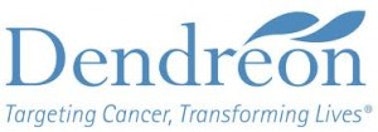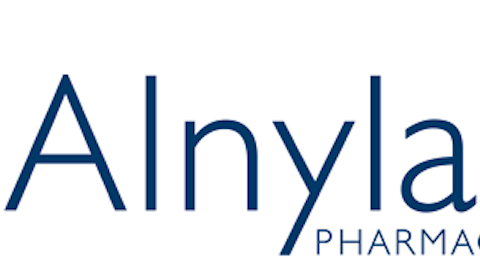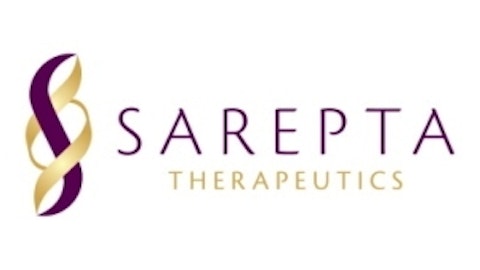
Zytiga’s not slowing down
Johnson & Johnson (NYSE:JNJ)’s total sales for the quarter were $17.88 billion. But one of its largest segments, global pharmaceuticals — with $7 billion in sales — grew 12% year over year. The primary reason for this growth was the continued strength of new product launches from Xarelto (an anticoagulant), Incivo (which treats hepatitis C), and of course, Zytiga.
For the second quarter, sales of Zytiga were $395 million. This represents a 70% year-over-year gain for the blockbuster cancer drug. Furthermore, it represents 71% growth for the first six months of 2013.
Now, in regards to Johnson & Johnson (NYSE:JNJ)’s long-term stock performance, Zytiga has little meaning. Analysts project peak sales of $1.8 billion by 2015, which is fairly small in comparison to the company’s near $70 billion in annual revenue. However, these sales are crushing for Dendreon Corporation (NASDAQ:DNDN).
Connecting the dots
Dendreon Corporation (NASDAQ:DNDN) markets Provenge, which also targets late-stage prostate cancer patients. In 2011, it was one of the only drugs for this disease on the market, and analysts projected peak sales over $1 billion. However, analysts and investors have since feared how the company would respond to both Zytiga and Medivation Inc (NASDAQ:MDVN)’s new prostate cancer drug Xtandi.
Last quarter, for the first time since Provenge’s launch, sales of the drug declined year over year. The 17.6% decline was not expected, and management was honest about the impact of new competition. At the same time, while sales of Provenge were just $67.6 milllion, Zytiga’s sales grew more than 70% to $344 million. This showed a direct correlation between the declines of Provenge and the success of Zytiga.
Now, in this most recent quarter, sales of Zytiga have grown even more rapidly, at nearly $400 million. Therefore, common sense suggests more pain for Dendreon Corporation (NASDAQ:DNDN). Moreover, sales of Medivation Inc (NASDAQ:MDVN)’s Xtandi were $75.4 million in the U.S. alone. This represented an increase of $18 million over the prior quarter. This shows that both Xtandi and Zytiga are gaining traction, while Provenge may be seeing the beginning of its end.
Why is Provenge lagging?
Retail investors unfamiliar with the story might wonder why Provenge is falling behind. Also, why is Provenge stuck with annual sales of $311 million, while Zytiga and Xtandi have peak sales outlooks of $1.8 billion and $2.2 billion, respectively?
First, all three drugs treat advanced stages of prostate cancer, and all three extend life in a range of three to five months. However, Provenge is an immunotherapy, meaning it targets specific antigens that are expressed by the cancer. By attacking the antigen, the immune system can then work to fight the disease.
Xtandi and Zytiga work differently. They both work to stop the production of hormones that that aid in the growth of the tumor. Thus, while all three add life to patients, both Zytiga and Xtandi actually reduce the growth of tumors; Provenge does not.
Also, Provenge is significantly more expensive. It must be given in a hospital setting with an IV drip. It also requires a blood draw for each dose of Provenge, since the treatment can not be frozen or stored. Both Xtandi and Zytiga are in pill form, meaning no IV and fewer trips to the hospital with lower patient and physician costs. These advantages combined have led Xtandi and Zytiga to emerge as clear winners, while Provenge appears obsolete.
Which Drug Is Superior?
Right away, Dendreon Corporation (NASDAQ:DNDN) investors will say that Medivation Inc (NASDAQ:MDVN) is a repeat of Dendreon, and that its $2.2 billion in peak sales potential will never materialize. However, keep in mind that one of Dendreon Corporation (NASDAQ:DNDN)’s chief problems was that they created issues with physicians very soon in the launch process, with spotty coverage and slow reimbursements. Some physicians have not forgotten, but Medivation is doing much better with 98% of Medicare and commercial insurers covering Xtandi.
Aside from a better delivery, Xtandi is also superior to Zytiga because there is no need for steroids while on treatment. Also, at the end of Medivation’s last quarter, with Xtandi early in its launch, Medivation disclosed that 90% of surveyed oncologists were aware of Xtandi. This is far better than what Dendreon accomplished, and is why Xtandi should succeed as the best drug, and is worthy of its $4.25 billion market cap.
Conclusion
I may be wrong, but this looks like the beginning of the end for Provenge and Dendreon. Provenge is a drug of inconvenience, and has already begun to see its sales decline, while the number of patients diagnosed with prostate cancer continues to rise.
Therefore, with Dendreon Corporation (NASDAQ:DNDN) still having to endure the high costs associated with manufacturing and delivering Provenge, I believe its operating margin of negative 83% will continue. I also anticipate that with just $275 million in cash, $86 million in current liabilities, and a net loss of $361 million during the last 12 months, Dendreon will need aggressive financing soon, which will further accelerate its next push lower.
The article Is Time Running Out for This Fallen Biotech? originally appeared on Fool.com and is written by Sherrie Stone.
Sherrie Stone has no position in any stocks mentioned. The Motley Fool recommends Johnson & Johnson. The Motley Fool owns shares of Dendreon and Johnson & Johnson. Sherrie is a member of The Motley Fool Blog Network — entries represent the personal opinion of the blogger and are not formally edited.
Copyright © 1995 – 2013 The Motley Fool, LLC. All rights reserved. The Motley Fool has a disclosure policy.





